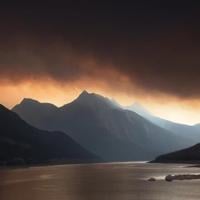Here is a roundup of stories from CanadaNewsMedia designed to bring you up to speed…
Backcountry campers not deterred by Jasper fire
Some backcountry campers rescued from the wildfire in Jasper National Park say they’re not deterred from going out again.
A massive wildfire last week forced 25,000 people to flee the Alberta park and its townsite. Fire later destroyed a third of the town.
Parks Canada says 245 campers were evacuated from the backcountry.
Among them were Charles Vantanajal and his family, who were hiking when they saw smoke near Oldhorn Mountain, but didn’t think that they were in any danger because the fire appeared to be far away.
They ended up being rescued by helicopter, while others were moved by boat.
Here’s what else we’re watching…
Nygard to be sentenced for sex assault convictions
Former fashion tycoon Peter Nygard is expected to be sentenced today after he was convicted on four counts of sexual assault last fall.
Nygard’s lawyer argued for a six-year sentence in a Toronto court last week, citing the 83-year-old’s advanced age and multiple health challenges. Prosecutors have asked for a sentence of 15 years.
Both the defence and Crown have asked the court to give Nygard credit for each of the more than 1,000 days he has spent in custody so far, but prosecutors say that credit should be calculated on a one-to-one basis, rather than 1.5.
Nygard was found guilty last November of four sex assault charges but was not guilty of a fifth count as well as one of forcible confinement.
The allegations against him dated from the 1980s until the mid-2000s.
Landslide poses risks for struggling salmon
An expert on British Columbia’s salmon populations says the massive landslide that blocked off part of Canada’s largest sockeye salmon run has created an unprecedented situation potentially putting the already struggling fish at even more risk.
Scott Hinch, the associate dean at the University of British Columbia’s Pacific Salmon Ecology and Conservation Laboratory, says debris piled 30 metres high and 600 metres long is blocking the Chilcotin River. It could cause problems for chinook and sockeye populations both while the water is being held back and when it eventually bursts free.
“These are natural events, but what’s unusual about this event is it’s occurring at a time when the rivers are way warmer than they used to be,” he said in an interview Thursday.
“And that creates this unprecedented lack of understanding of what’s going to happen to these fish.”
The Chilcotin is a tributary of the Fraser River and officials with the province and Cariboo Regional District say it’s uncertain if the lake building behind the dam will burst or if it will top the debris. The B.C. government said a release could swell the Fraser River for hundreds of kilometres, potentially setting off dozens of emergency evacuations and alerts.
Cancellations followed renewables pause: study
Alberta’s seven-month moratorium on renewable power approvals has left a legacy of dozens of cancelled projects and legal uncertainty, says an analysis done on the one-year anniversary of the move.
The Pembina Institute, a clean energy think tank, says in a report released Friday that 53 wind and solar projects were abandoned after the United Conservative Party government paused approvals for seven months then failed to clarify new rules for those developments.
The capacity of the cancelled projects adds up to 8,600 megawatts of generation — more than enough to power every home in Alberta, the report says. Many of those projects would have come with substantial storage capacity.
Another 42 projects have been delayed by an average of 15 months.
The province — once Canada’s hotbed of renewable activity — has seen three new projects come before its system operator since the moratorium was announced Aug. 2, 2023.
Small businesses going for gold with athlete deals
When cyclist Alison Jackson jumps on her bike at the Olympic Games in Paris, she’ll be aiming for a gold medal, but at Eighty-Eight Brewing Co., it’ll be all about her Personal Best.
The Calgary business will split proceeds from its aptly named beer — a pale ale with a tropical aroma and a bright red can bearing a sketch of a retro jacket — between Jackson and fellow athletes, rower Kasia Gruchalla-Wesierski and wheelchair basketball player Nikola Goncin.
“It doesn’t bring in a huge amount of profit for us because we give that money to the athletes,” said Kevin Mitchell, Eighty-Eight’s marketing manager. “But we find that with the brand recognition and (the athletes) exposing us to new consumers, it’s definitely a worthwhile undertaking.”
The partnership Eighty-Eight struck with the trio of Olympic competitors is just one of the many endorsements and funding arrangements uniting small businesses looking to boost their brands with Canadian athletes, who know more cash or name recognition seldom hurts their careers.
Among the partnerships publicized in the years leading up to the Games and as athletes landed in France was a deal between rower Jill Moffatt and Big Wheel Burger in B.C., and another tying Kristina Walker, also a rower, to Surrey, B.C.-based turf and track installer Marathon Surfaces.
This report by The Canadian Press was first published Aug. 2, 2024.
